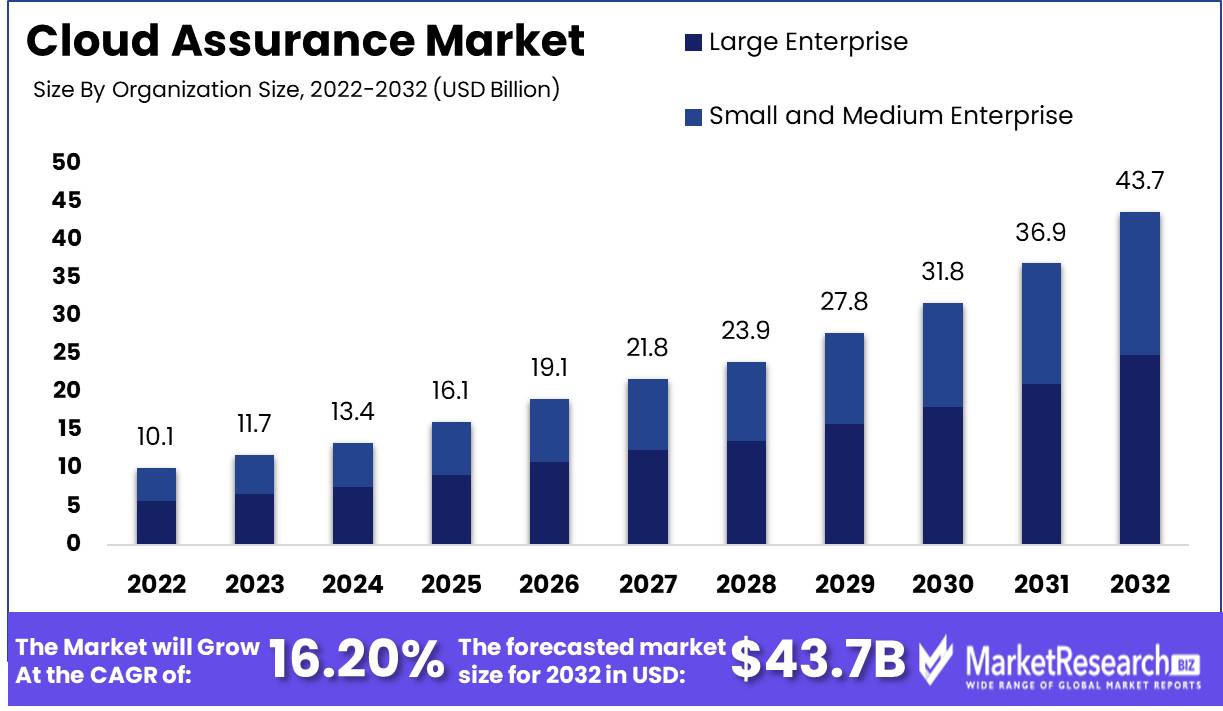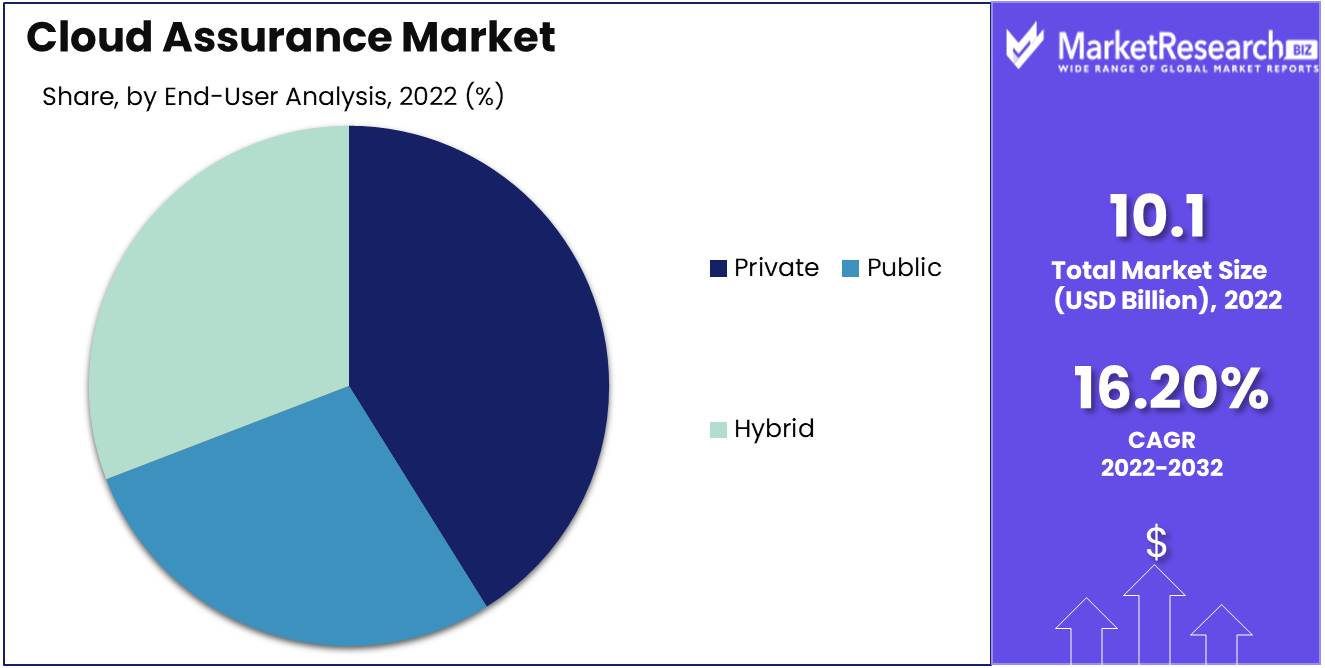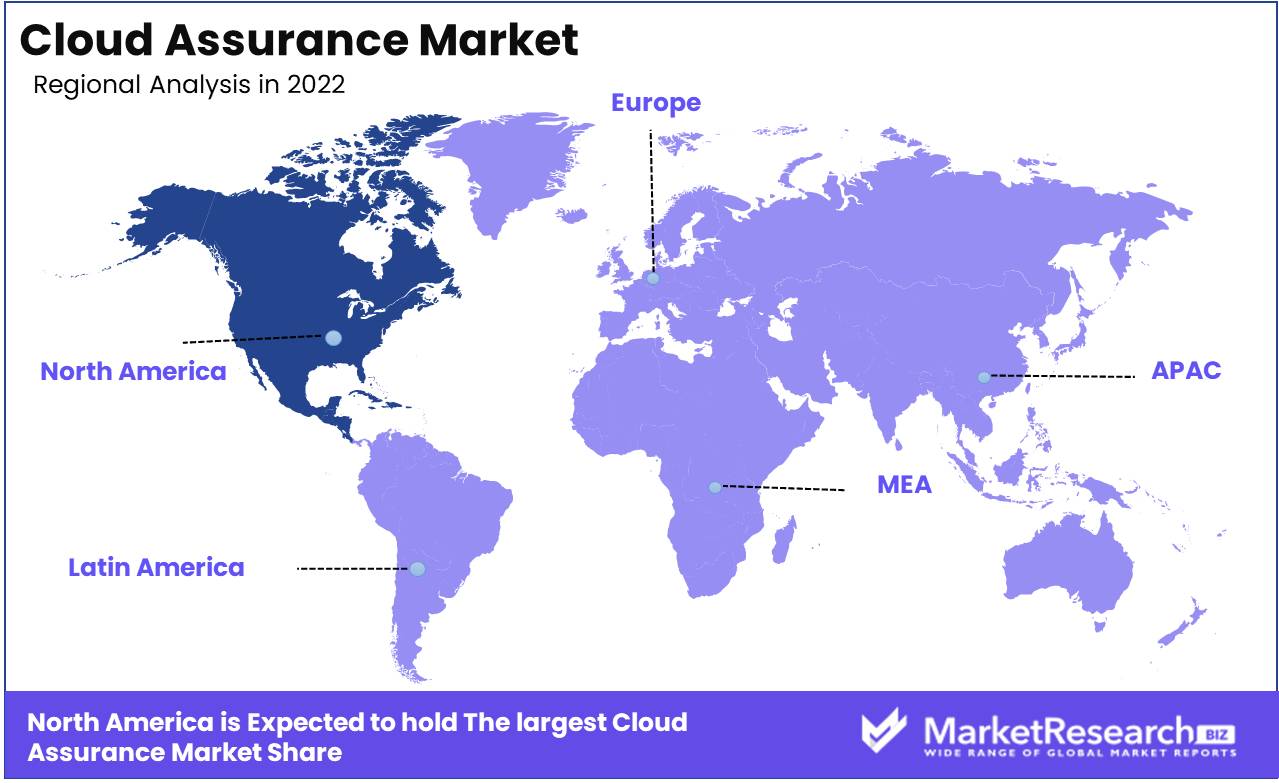
Global Cloud Assurance Market By Organization Size (Large Enterprise, Small and Medium Enterprise), By Deployment (Private, Public, Other), By End-Users (IT and Telecom, Retail,Government Agencies, Other End-Users), By Region And Companies - Industry Segment Outlook, Market Assessment, Competition Scenario, Trends, And Forecast 2023-2032
-
37381
-
June 2023
-
179
-
-
This report was compiled by Vishwa Gaul Vishwa is an experienced market research and consulting professional with over 8 years of expertise in the ICT industry, contributing to over 700 reports across telecommunications, software, hardware, and digital solutions. Correspondence Team Lead- ICT Linkedin | Detailed Market research Methodology Our methodology involves a mix of primary research, including interviews with leading mental health experts, and secondary research from reputable medical journals and databases. View Detailed Methodology Page
-
Quick Navigation
Report Overview
Global Cloud Assurance Market size is expected to be worth around USD 43.7 Bn by 2032 from USD 10.1 Bn in 2022, growing at a CAGR of 16.20% during the forecast period from 2023 to 2032.
Due to the increasing popularity of cloud computing, mounting security concerns, and the persistent need for regulatory frameworks, the ever-expanding worldwide cloud assurance market is experiencing impressive growth. In order to give users, consumers, and stakeholders a sense of assurance and trust, the core function of cloud assurance is to protect the security, dependability, and compliance of cloud-based services or systems. This assurance, which has been carefully prepared, aims to uphold compliance, improve performance, and address privacy concerns squarely.

Numerous advances have emerged in the field of cloud assurance, opening the door for automated and strengthened assurance procedures. Cloud assurance may now soar to previously unheard-of heights thanks to artificial intelligence and machine learning as vanguards. Parallel to this, cloud-native security and compliance solutions have spread their wings, ready to tackle the special issues that cloud environments provide.
Aiming to meet the insatiable expectations of discerning clients while also establishing a distinct market for their products, market titans in the cloud space have jumped headfirst into significant investments focused on cloud assurance solutions in an effort to solidify their position. AWS and Microsoft Azure are two prominent examples of these market leaders, each of which offers a wide range of cloud assurance solutions that have been painstakingly created to secure and control cloud environments with maximum efficacy.
Cloud security, governance, compliance, risk management, performance monitoring, and the capacity to coordinate effective incident response mechanisms are just a few of the crucial topics that are covered by the wide-ranging applications of the cloud assurance market. In order to protect the integrity of their cloud ecosystems in the face of strict rules, a variety of businesses, including but not limited to BFSI, healthcare, government, retail, and manufacturing, have backed cloud assurance.
The staggering advancements in artificial intelligence and machine learning, as well as the mounting emphasis on security and compliance, are the driving forces behind the cloud assurance market's meteoric growth. In order to reduce risks and improve incident response, organizations are fervently pursuing cloud assurance solutions that are endowed with end-to-end visibility, automation, and the capacity to tap into the power of intelligent analytics. Navigate the evolving Cloud Assurance Market and leverage cutting-edge solutions within the broader realm of Cloud Infrastructure Services.
Problems with ethics and the quest for ethical behavior play a crucial role in this large environment. The principles that must continue to guide the development and application of cloud assurance solutions are transparency, explainability, and uncompromising accountability. Unrelenting monitoring, exacting testing, ongoing improvement, and the priceless input garnered from stakeholders and users alike are all necessary for a commitment to responsible practices.
Utilizing the wide range of advantages available, enterprises adopting cloud assurance can enjoy the halo of reduced data breaches, decreased downtimes, improved compliance and governance, and the effervescent halo of increased client trust. Additionally, cloud assurance is well-suited to handle the art of maximizing cloud usage and reducing costs by locating redundant resources.
Organizations must continuously monitor the shifting landscape of trends, technologies, and regulatory frameworks to guarantee the security and dependability of their treasured cloud-based services as the cloud assurance market spreads its wings and soars to previously unimaginable heights.
Driving factors
Rising Cloud Computing Adoption Drives Demand for Cloud Assurance Services
Cloud computing is being adopted more frequently thanks to the cloud assurance market. The demand for cloud assurance services is growing as more and more businesses switch to cloud-based solutions. Concerns about data security and the requirement to adhere to regulatory standards have further driven this trend.
Observe Regulatory Changes Affecting the Market for Cloud Assurance
Regulations are essential to the market for cloud assurance, and any changes to them could have a big effect on how quickly the business expands. As a result, it is crucial to monitor any recent or upcoming changes to rules that may have an impact on the market. To function lawfully, a corporation must make sure that its cloud services adhere to certain laws.
Using AI and Machine Learning to Ensure the Security of the Cloud
The market for cloud assurance could be significantly impacted by emerging technologies like artificial intelligence and machine learning. By facilitating the detection and prevention of security breaches, these technologies may ultimately stimulate industry expansion.
Understanding Market Disruptors for Cloud Assurance
Potential disruptors like new competitors, changing consumer preferences, and shifting market dynamics may also have an effect on the competitive environment of the cloud assurance market. To remain relevant and competitive in the market, businesses must adapt to these developments.
Cloud Assurance Demand Is Driven by Data Privacy and Security
Finally, it is crucial to monitor any new trends or modifications in consumer behavior that may have an effect on the development of the cloud assurance market. Cloud assurance services may become more popular as a result of consumer concern over data security and privacy. Businesses that adjust their services quickly to these trends will have an advantage in this cutthroat market.
Restraining Factors
The Cloud Assurance Market Expands as Cloud Computing Gains in Popularity
Recent years have seen a significant expansion of the cloud assurance market, which can be attributed to the increased popularity of cloud computing. The growth of this market is, however, constrained by a number of variables.
Challenges Associated with the Complexity of Cloud Infrastructure Growth in the Cloud Assurance Market
One of the major factors influencing the growth of the cloud assurance market is the complexity of cloud infrastructure. There are many different cloud service providers, and each one has a distinctive infrastructure that is difficult to comprehend. The main cause of organizations' challenges in choosing the best cloud provider and guaranteeing the security of their data is this complexity.
Skills Gap Restrains Cloud Assurance Market Growth
Additionally, a lot of organizations lack the internal skills needed to implement and manage cloud infrastructure efficiently. As a result, there is a dearth of qualified personnel who can guarantee that the cloud infrastructure complies with industry requirements and is secure.
Lack of Qualified Professionals Restrains the Growth of the Cloud Assurance Market
Another important aspect that has an impact on the growth of the cloud assurance market is the lack of qualified workers. The majority of organizations are now switching to cloud-based services, and as a result of the rising demand, there is a dearth of qualified specialists on the market.
Lack of Cloud Expertise Raises Costs for Cloud Services, Impacts Market Growth
A full understanding of the cloud infrastructure and how it interacts with various applications and services is necessary for cloud computing, which needs a new set of skills from traditional IT. Because of the lack of qualified workers, cloud services have become more expensive, rendering them out of reach for many small and medium-sized organizations.
Security Concerns Slow Cloud Services Adoption, Affecting the Growth of the Cloud Assurance Market
Additionally, some organizations prefer to keep their data on-premise because they are concerned about the security risks connected with cloud services. The adoption of cloud-based services has been slowed down by this aversion to change, which has also had an impact on the cloud assurance market's growth. Hybrid Cloud empowers businesses in the Cloud Assurance sector by offering a versatile infrastructure, enhancing reliability, and ensuring optimal performance for clients' peace of mind.
By Organization Size Analysis
The large enterprise segment dominates the global cloud assurance market. Given the extensive resources and budgets that large enterprises can employ in cloud assurance, this is not surprising. They are able to employ top-tier cyber security professionals to ensure that their cloud infrastructure is secure and reliable. In addition, they possess more sensitive data and complex IT systems, which accentuates the need for cloud assurance. Smaller organizations may lack the resources and knowledge necessary to effectively implement and administer cloud assurance measures.
The growth of industries in emerging markets is also a factor in the adoption of the large enterprise segment. As businesses in these regions expand and compete globally, they recognize the need to invest in cloud assurance to maintain their competitiveness. As a consequence, there is a growing demand for cloud assurance services, which is fueling the growth of the large enterprise segment.
In the market for cloud assurance, it is also fascinating to examine consumer trends and behaviors toward the large enterprise segment. Consumers are increasingly conscious of the significance of data privacy and security. Organizations that can demonstrate a commitment to consumer data security will likely enjoy a competitive advantage.
By Deployment Analysis
The private segment dominates the cloud assurance market, as opposed to the large enterprise segment. This is primarily because of security concerns regarding public clouds. Private clouds offer the benefit of a more secure infrastructure that can be tailored to the unique requirements of each business. Moreover, private clouds enable organizations to retain control over their data, thereby reducing the likelihood of data breaches.
The economic growth of emergent economies also drives the adoption of the private segment. As businesses in these regions expand and their data requirements become more complex, they require a more reliable and secure cloud infrastructure. The fact that organizations in emergent economies may not have the same level of trust in public clouds emphasizes the benefits of utilizing private clouds.
In the cloud assurance market, it is also worthwhile to investigate consumer trends and behaviors pertaining to the private segment. Consumers are more likely to have faith in businesses that prioritize data security and privacy. Consequently, organizations that can demonstrate a commitment to safeguarding customer data by utilizing private clouds may have a competitive advantage.

By End-Users Analysis
The IT and telecommunications industry segment leads the cloud assurance market. Given the nature of these industries, this is not surprising. The IT industry relies heavily on cloud services, and the telecom industry is constantly expanding its infrastructure to meet the rising demand for data transmission and storage.
Emerging economies are also propelling the adoption of the cloud assurance market's IT and telecom segment. As these regions continue to develop, the demand for data-driven services grows, driving the adoption of cloud-based services. The IT and telecom segment stands to gain the most from the growth of cloud assurance as a result.
In the cloud assurance market, consumer trends and behaviors toward the IT and telecom segment are also worth analyzing. Consumers are more likely to have faith in businesses that can demonstrate a commitment to data security.
Key Market Segments
By Security Type
- Cloud Encryption
- Cloud Database Security
- Email & Web Security
- Cloud IAM (Identity And Access Management)
- Data Loss Prevention
- Network Security
By Organization Size
- Large Enterprise
- Small and Medium Enterprise
By Deployment
- Private
- Public
- Hybrid
By End-Users
- IT and Telecom
- Retail
- Government Agencies
- Healthcare
- Banking, Financial Services and Insurance (BFSI)
- Manufacturing
- Other End-Users
Growth Opportunity
The Cloud Assurance Market Explodes as Demand for Secure Cloud Services Explodes
Cloud assurance is a rapidly expanding market, driven by the growing demand for secure and dependable cloud services. This market's growth potential is fueled by advanced cloud assurance solutions, the integration of AI and automation, and expansion in emerging markets.
Advanced Cloud Assurance Solutions A Holistic Risk Management Approach
Cloud assurance solutions provide a thorough strategy for reducing the risks connected to cloud-based assets. These solutions provide organizations with a single source of truth for cloud security, compliance, and governance, enabling them to maintain control over cloud-based assets. Advanced cloud assurance solutions provide organizations with capabilities such as real-time monitoring, threat intelligence, and policy automation, allowing them to remain ahead of emerging threats.
Security-First Organizations Embrace Innovative Cloud Assurance Options
The demand for sophisticated cloud assurance solutions is driven by the necessity for businesses to manage the security risks associated with cloud environments. As the number of cyberattacks rises, businesses search for methods to safeguard their cloud-based assets from unauthorized access. The need for increased visibility, control, and security in the cloud is expected to drive an increase in the adoption of advanced cloud assurance solutions.
The Impact of AI and Automation on the Cloud Assurance Market
AI and automation technologies are reshaping the market for cloud assurance. The incorporation of AI into cloud assurance solutions enables organizations to automate risk evaluation, threat detection, and incident response. Cloud assurance solutions enabled by AI can rapidly identify potential vulnerabilities and anomalies, allowing organizations to take preventative measures to mitigate risks.
Implementation of Effective and Proactive Automation in Cloud Assurance Solutions
The integration of automation technologies with cloud assurance solutions simplifies the administration of cloud environments, thereby reducing human error and boosting productivity. The use of automation technologies also enables organizations to respond rapidly to incidents, mitigating the consequences of security breaches.
Cloud Assurance Market Growth Is Accelerated by Emerging Markets
The global cloud assurance market's expansion potential is also fueled by emerging cloud assurance markets. Emerging economies including China, India, Brazil, and South Africa are enduring digital transformations, which is driving demand for cloud-based solutions in these regions. The market for cloud services is expected to grow in these regions, driven by the demand for cost-effective and scalable solutions.
Latest Trends
Cloud Security Solutions Protecting Data in the Cloud
The accelerated development of cloud computing technology has increased the adoption of cloud-based services by businesses and individuals alike. With this growth has come the need for trustworthy cloud security solutions to secure sensitive data from cyberattacks.
Cloud Security Evaluations Protecting Information in the Cloud Environment
Cloud security assessments are one of the main market trends that are shaping the cloud assurance market. As more companies migrate their data to the cloud, they must ensure that it is secure and protected against cyber threats. Cloud security assessments aid companies in identifying vulnerabilities in their cloud infrastructure and provide recommendations for enhancing security.
Cloud Security Against Cyber Threats is Improved by Real-Time Monitoring
Real-time monitoring is another significant market trend influencing the global cloud assurance market. Companies must be able to monitor their cloud infrastructure in real-time to detect any malicious activity and take immediate action in light of the increasing number of cyber threats. Real-time monitoring tools provide companies with real-time alerts and notifications of any suspicious activity, allowing for a swift and effective response.
Stay One Step Ahead by Leveraging Threat Intelligence for Cloud Security
Another significant market trend that is influencing the global cloud assurance market is threat intelligence. Threat intelligence solutions provide companies with real-time information on new and emerging cyber threats, enabling them to remain ahead of the curve and take proactive measures to protect their cloud infrastructure.
Cloud-Native Security Solutions Tailored Cloud Environment Protection
Cloud-native security solutions are yet another significant market trend that is influencing the global cloud assurance market. As companies migrate their data to the cloud, they require security solutions that are tailored to cloud environments. Cloud-native security solutions provide a variety of security features, such as data encryption, access control, and network segmentation, to help companies secure their cloud infrastructure.
Regional Analysis
The Cloud Assurance Market is dominated by North America The cloud is essentially a necessity for most businesses. Access to critical data in real-time, automation, and increased agility are just a few of its many benefits. Nevertheless, cloud computing carries an inherent risk: cybersecurity. Consequently, cloud assurance has become a crucial component of any enterprise utilizing cloud infrastructure.
Cloud assurance consists of policies, processes, and tools that aid in ensuring the accountability, security, and conformance of cloud infrastructures for organizations. Cloud assurance enables both cloud providers and cloud consumers to guarantee that their cloud environment adheres to quality standards.
Experts predict that the cloud assurance market will experience accelerated growth over the next few years. This expansion will be driven primarily by the increasing need for businesses and organizations to adhere to the strictest data regulations.
North America leads all other regions in the cloud assurance market, with the United States having the largest cybersecurity market due to its technological advances. In addition, the United States is experiencing significant growth in the cloud assurance market, as many businesses have adopted cloud-based operations and infrastructure.
In addition, North America is home to some of the largest cloud providers that offer cloud assurance services, including Amazon Web Services, Microsoft, and Google. These companies are the greatest investors in the market for cloud assurance. Consequently, given that North America is a hub for these companies, the region is the largest player in cloud assurance.

Key Regions and Countries
North America
- US
- Canada
- Mexico
Western Europe
- Germany
- France
- The UK
- Spain
- Italy
- Portugal
- Ireland
- Austria
- Switzerland
- Benelux
- Nordic
- Rest of Western Europe
Eastern Europe
- Russia
- Poland
- The Czech Republic
- Greece
- Rest of Eastern Europe
APAC
- China
- Japan
- South Korea
- India
- Australia & New Zealand
- Indonesia
- Malaysia
- Philippines
- Singapore
- Thailand
- Vietnam
- Rest of APAC
Latin America
- Brazil
- Colombia
- Chile
- Argentina
- Costa Rica
- Rest of Latin America
Middle East & Africa
- Algeria
- Egypt
- Israel
- Kuwait
- Nigeria
- Saudi Arabia
- South Africa
- Turkey
- United Arab Emirates
- Rest of MEA
Key Players Analysis
The cloud assurance market is extremely competitive and expanding at a rapid rate. Major technology companies, specialized security firms, and cloud service providers are the market's primary players. These players have prioritized expanding their portfolios of cloud assurance services, primarily through mergers and acquisitions.
IBM Corporation is well-known for its comprehensive security offerings for public, hybrid, and private cloud deployments, making it one of the major players in the market for cloud assurance. Microsoft Corporation, another significant player, has developed a vast array of security features and policies for its Azure cloud platform.
Oracle Corporation is an additional important player in the cloud assurance market, with a portfolio of cloud assurance solutions designed to detect and remediate any security vulnerabilities, misconfigurations, and access issues that may arise in cloud environments.
Accenture, one of the largest consulting firms, is also a significant market player. With its extensive expertise and experience in cloud implementation, it has developed a vast array of cloud assurance services for its customers.
Top Key Players in Cloud Assurance Market
- Infosys Limited (India)
- Cisco Systems, Inc (U.S.)
- IBM (U.S.)
- mycom-osi (U.K.)
- NETSCOUT (U.S.)
- EFORTRESSES. (U.S.)
- Capgemini (France)
- Deloitte (U.K.)
- Fortinet Inc. (U.S.)
- Broadcom Inc, (U.S.)
- Intel Corporation (U.S.)
- Microsoft (U.S.)
- Hewlett Packard Enterprise Development LP (U.S.)
- Trend Micro Incorporated (U.S.)
- McAfee, LLC (U.S.)
- Wipro Limited (India)
- Dell Inc (U.S.)
- Okta (U.S.)
- Accenture
- Oracle Corporation
- Other Key Players
Recent Development
- In 2023, The demand for cloud assurance services is anticipated to rise as cloud computing adoption continues to rise.
- In 2022, The Cloud Security Alliance released the Cloud Controls Matrix, a novel set of security controls for cloud computing.
- In 2021, The Biden administration released a new executive order on cybersecurity, which included several cloud assurance provisions.
- In 2020, The COVID-19 pandemic accelerated the transition to cloud computing, as companies of all sizes scrambled to acclimate to the new cloud computing environment.
Report Scope:
Report Features Description Market Value (2022) USD 43.7 Bn Forecast Revenue (2032) USD 10.1 Bn CAGR (2023-2032) 16.20% Base Year for Estimation 2022 Historic Period 2016-2022 Forecast Period 2023-2032 Report Coverage Revenue Forecast, Market Dynamics, COVID-19 Impact, Competitive Landscape, Recent Developments Segments Covered By Security Type (Cloud Encryption, Cloud Database Security, Email & Web Security, Cloud IAM, Data Loss Prevention, Network Security), By Organization Size (Large Enterprise, Small and Medium Enterprise), By Deployment (Private, Public, Hybrid), By End-Users (IT and Telecom, Retail, Government Agencies, Healthcare, Banking, Financial Services, and Insurance, Manufacturing, Other End-Users) Regional Analysis North America – The US, Canada, & Mexico; Western Europe – Germany, France, The UK, Spain, Italy, Portugal, Ireland, Austria, Switzerland, Benelux, Nordic, & Rest of Western Europe; Eastern Europe – Russia, Poland, The Czech Republic, Greece, & Rest of Eastern Europe; APAC – China, Japan, South Korea, India, Australia & New Zealand, Indonesia, Malaysia, Philippines, Singapore, Thailand, Vietnam, & Rest of APAC; Latin America – Brazil, Colombia, Chile, Argentina, Costa Rica, & Rest of Latin America; Middle East & Africa – Algeria, Egypt, Israel, Kuwait, Nigeria, Saudi Arabia, South Africa, Turkey, United Arab Emirates, & Rest of MEA Competitive Landscape Infosys Limited (India), Cisco Systems, Inc (U.S.), IBM (U.S.), mycom-osi (U.K.), NETSCOUT (U.S.), EFORTRESSES. (U.S.), Capgemini (France), Deloitte (U.K.), Fortinet Inc. (U.S.), Broadcom Inc, (U.S.), Intel Corporation (U.S.), Microsoft (U.S.), Hewlett Packard Enterprise Development LP (U.S.), Trend Micro Incorporated (U.S.), McAfee, LLC (U.S.), Wipro Limited (India), Dell Inc (U.S.), Okta (U.S.), Accenture,Oracle Corporation, Other Key Players Customization Scope Customization for segments, region/country-level will be provided. Moreover, additional customization can be done based on the requirements. Purchase Options We have three licenses to opt for: Single User License, Multi-User License (Up to 5 Users), Corporate Use License (Unlimited User and Printable PDF) -
-
- Infosys Limited (India)
- Cisco Systems, Inc (U.S.)
- IBM (U.S.)
- mycom-osi (U.K.)
- NETSCOUT (U.S.)
- EFORTRESSES. (U.S.)
- Capgemini (France)
- Deloitte (U.K.)
- Fortinet Inc. (U.S.)
- Broadcom Inc, (U.S.)
- Intel Corporation (U.S.)
- Microsoft (U.S.)
- Hewlett Packard Enterprise Development LP (U.S.)
- Trend Micro Incorporated (U.S.)
- McAfee, LLC (U.S.)
- Wipro Limited (India)
- Dell Inc (U.S.)
- Okta (U.S.)
- Accenture
- Oracle Corporation
- Other Key Players




